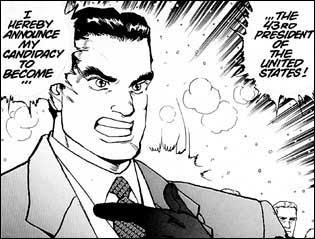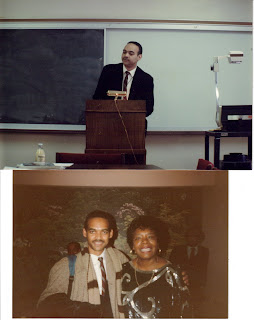
Given that race, ethnicity, gender, religion, and other categories of identity have emerged as key issues of debate in the current presidential election process, I thought I'd offer up my review of the graphic novel series,
Eagle: The Making of an Asian American President, as a way to start a discussion about minority representation (political, cultural, literary).
Kaiji Kawaguchi.
Eagle: The Making of an Asian American President. English Adaptation by Carl Gustav Horn. Translated by Yuji Oniki. Vol. 1-5. San Francisco: Viz Comics, 2000-2002.
(Originally published in the Fall 2007 issue of
MELUS: Journal of the Society for the Study of the Multi-Ethnic Literature of the U.S.)
In his now famous keynote speech for the 2004 Democratic National Convention, Barack Obama has said that an election is about our decision to participate in a politics of cynicism or a politics of hope, and that hope, to him, is represented by “a skinny kid with a funny name who believes that America has a place for him, too.” With aspirations for the presidency himself, the implicit suggestion of Obama’s remark is his hope that America would prove itself enlightened enough to elect someone “with a funny name” to the nation’s highest office. Kaiji Kawaguchi’s manga series,
Eagle: The Making of an Asian American President, seems to have been conceived with these sentiments in mind.
Eagle follows the fictional election campaign of Kenneth Yamaoka, a third-generation Japanese American seeking to become the 43rd president of the United States. Told primarily from the perspective of Takashi Jo, a Japanese journalist who is also Yamaoka’s illegitimate son,
Eagle offers an entertaining and at times critically astute dramatization of U.S. electoral politics, covering everything from campaign debates and speeches to the melodrama of the candidate’s private life.
Despite the fact that
Eagle was roundly praised by comics reviewers and awarded several Eisner Awards (the top prize in comics art), the series did not find a large audience in the U.S. market. And while it ostensibly foregrounds ethnicity as the organizing narrative theme, it has escaped the critical radar of ethnic literature scholars. This is, I suspect, in part because American comics readers find the story’s premise—an Asian American presidential hopeful—somewhat outlandish, and in part because academics have been slow to accept comics as a genre worthy of scholarly examination. But there is much about
Eagle that warrants a closer look by virtue of the provocative hypothetical question it poses. As one character in the series so efficiently puts it, “How far will the first Japanese American candidate to enter a presidential election go?” (Vol I:68).
Very far, it turns out—at least in Kawaguchi’s optimistic view of the American political process.
Eagle is, in many ways, a superhero romance disguised as a political thriller. The hero, Yamaoka, is endowed with superior intelligence, verbal eloquence, and loads of charisma.. A staunch defender of immigrant and workers’ rights and a supporter of liberal values, Yamaoka is a posterboy for the promises of the American Dream. We watch with incredulity, and perhaps with some glee, as he gives rousing speeches, wins debates, shores up support in droves, and smooths every wrinkle on his way to the presidency. We shake our heads with disbelief when Yamaoka lays out his platform of pipe dreams (financing Mexico’s economic stability in order to solve the immigration crisis, shutting down all U.S. military bases abroad, among others) and still climb steadily in the polls. In one particularly astonishing episode, he even manages to convince a group of Texan ranchers to support his call for tighter gun control! Indeed, reading
Eagle often feels like an exercise in wish fulfillment. Wouldn’t it be uplifting if America has overcome its racist hang-ups and proved itself enlightened enough to put a non-white president—and one who espouses leftist politics to boot— in the White House?
Eagle, however, is not just a saccharine story about American optimism. Kawaguchi exposes the dark side of politics as well, particularly the ethically questionable sub-rosa machinations of the parties involved, the persisting symptoms of racial intolerance in American society that circumscribe ethnic political representation, and most significantly, the Anglo model of Americanness that high government offices are still expected to represent. As one character in
Eagle points out, “‘Eisenhower’ is about as funny-sounding as [the names of presidents] have ever got. No ‘skis’. . . no ‘steins’ . . . let alone anything like ‘Yamaoka.’ Two hundred years since George Washington and in all that time there’s been exactly one president who wasn’t a white Anglo-Saxon protestant. And look what happened to him” (Vol. IV:197). Other scenes, such as the hate speech graffitied on Yamaoka’s home and the two assassination attempts at a campaign stop, effectively (if at times melodramatically) capture the potential for deep-seated racism to find open expression when ethnics gain visibility in institutions of power.
Beyond these merits, however,
Eagle fails to provide a nuanced examination of the complexities of ethnic subjectivities and conflicts. For example, Yamaoka’s Japanese ancestry seems merely incidental. His Japanese ancestry is inscribed simply as an accident of skin color; it plays no part in his subject formation, nor does it serve as the basis for meaningful ties to particular ethnic constituencies. He may be an Asian American candidate, but he does not represent the specific interests of Japanese Americans nor any other ethnic group. Rather, he represents a broad-based pro-immigration stance modeled ostensibly on the “nation of immigrants” creed of John F. Kennedy, with whom Kawaguchi carefully associates Yamaoka throughout the novel as a means to universalize (that is, de-racialize) Yamaoka’s appeal.
Graphic representations of Yamaoka and other ethnic or mixed-race characters also look more Caucasian than Asian. For instance, the Hispanicity of Yamaoka’s adopted daughter, Rachel, is revealed through dialogue and not through visual cues. It should be noted that, as many manga aficionados have pointed out, this testifies more to the aesthetic tradition of manga art and Kawaguchi’s artistic conventionality rather than his failure to render Japanese physical features more convincingly. While this raises the difficult question of how race and ethnicity should be represented visually in the comics medium, it is nevertheless disconcerting for readers to be unable to visually distinguish between characters of different races in a graphic novel that foregrounds ethnoracial politics as its principle subject matter.
Yamaoka’s whiteness, however, is coded less through the way his features are drawn, and more through Kawaguchi’s erasure of his Japanese ethnicity in favor of an all-American personal history. There is, in fact, little that is ethnic about Yamaoka with the exception of his name. Grandson of model-minority Japanese immigrants, Yale graduate, college football star, decorated Vietnam War veteran, New York Senator, and ex-New York District Attorney, Yamaoka’s profile is a composite of American heroic archetypes. His transformation from an “ethnic” to an “American” is made complete by his marriage to the daughter of a powerful New England family, the Hamptons, an alliance that effectively replaces his immigrant family history with a patrician, Anglo-American one. Kawaguchi makes little mention of the history of Japanese in America, and no mention at all of Japanese internment camps—an elision that seems all the more egregious and ironic when we note that Kawaguchi has modeled Yamaoka’s New Deal-like social policies on Franklin D. Roosevelt, the very president who signed the executive order that authorized the mass internment of Japanese Americans during World War Two.
Equally problematic is Kawaguchi’s association of the ethnic with female characters who threaten to spoil Yamaoka’s otherwise pristine, all-American profile. Yamaoka’s brief romance in Okinawa with Jo’s mother, Tomiko (whom he likens to “the South Pacific, something immutable” [Vol V:441]), and his alleged romance with Rachel’s biological mother, Maria, a Cuban American woman from the barrio, pose the most serious threats to his political reputation. These “illegitimate” ethnic women are pitted against Yamaoka’s legitimate white wife, Patricia, whom Yamaoka regards as a fitting partner because she is, in his words, “a soldier, someone with whom [he] could speak of dreams” (Vol. V:442). An opposition is thus established between the wealthy white woman who could empower him and the ethnic women who would cripple him—a formulation that betrays the masculinist and imperialist perspectives that undergird Kawaguchi’s representations of ethnic women.
If
Eagle fails to provide a sophisticated critique of U.S. identity politics, it might be because Kawaguchi is a Japanese national who has never lived in the U.S. and who spent only a few weeks in various regions of the U.S. “scouting location” and researching political processes. Nevertheless, the level of detail about U.S. electoral politics that Kawaguchi manages to provide is quite impressive.
Eagle also exemplifies in many ways a perfect marriage between genre and subject matter; after all, both comics and election campaigns are, in essence, a series of carefully “framed” spectacles for public consumption. Kawaguchi deserves high praise for his expert storytelling; the sensationalist plotlines (is Yamaoka responsible for Tomiko’s mysterious death? Is Rachel really his biological daughter?) are quite entertaining, and the roman-à-clef elements of the series, particularly the references to Al Gore and the Clintons (thinly disguised as “Al Noah” and “Bill and Ellery”) will no doubt elicit knowing smiles—or sneers—from the reader. Ultimately, a dialogic quality persists throughout the series, so that one is never quite sure if Kawaguchi is reinforcing or demystifying the powerful mythologies of the American Dream. This is what makes
Eagle an interesting text; it can be read either as Kawaguchi’s realistic rendering of the limitations that still exist for Asian American political representation, or his capitulation to the notion that ethnic types are palatable only if they are refashioned into familiar American archetypes.
- Betsy






